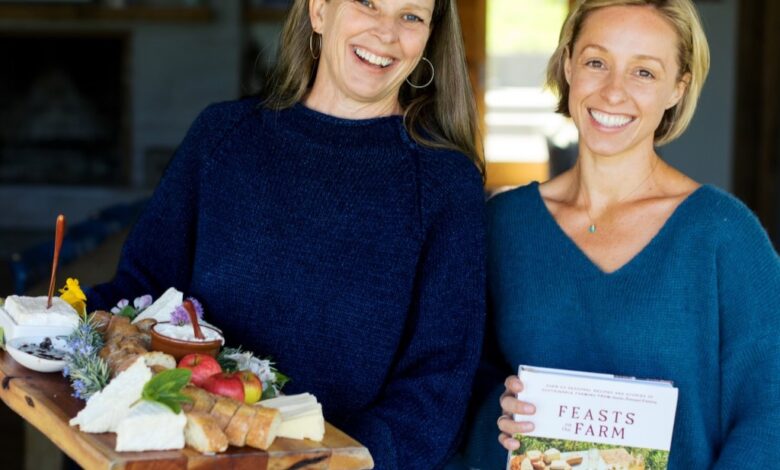Authors dish on new cookbook from Tomales Farmstead Creamery – The Mercury News

Amid the rolling hills of coastal Marin, you’ll find the idyllic Toluma Farms, a 160-acre goat and sheep dairy that’s also home to Tomales Farmstead Creamery. Owned by Tamara Hicks and David Jablons since 2003, the farm hosts tours, volunteers, homestays and more in addition to operating as a working dairy.
Hicks and collaborator Jessica MacLeod are the co-authors of a new cookbook highlighting seasonal recipes — featuring Tomales Farmstead Creamery cheeses, of course — called “Feasts on the Farm” (Chronicle Books, $30), set for release Aug. 5. We recently caught up with the authors to hear more about their beautiful forthcoming book and what makes Toluma Farms so special. Responses have been edited for length and clarity.
Q: What inspired you to write a cookbook?
Tamara: My husband, David, and I purchased the property a little over 20 years ago. Our passion for starting the farm came from trying to protect not only open space, but in particular, working farms and agriculture. Marin and Sonoma have a deep history of feeding the Bay Area, and we wanted to be part of that. We purchased an old cow dairy that had fallen out of the local food shed, and brought it back, then added cheese a decade in. We also have a strong apprenticeship program and welcome all people to the farm for tours. It’s one of the few farms that’s open in the area for people to educate themselves about what local farming is and why it’s important to protect it.
Jessica was one of our volunteers, and that’s how we met and became friends. We can’t afford to pay our volunteers, so we pay them in cheese. She would take cheese home and, hours later, send me these insane photos of meals that she made. Then she started making meals for the team at the farm.
Jessica: I started volunteering at the farm in 2020 at the height of the pandemic. I was working at a nonprofit doing rapid response work around the clock. I was on the computer all the time, so my husband suggested I get away from screens and do something that made me happy. I emailed Toluma Farm and asked if they needed any volunteers. I grew up in Marin, and when I started volunteering, I was just so blown away by how close we are to where our food comes from here.
I learned about the activism of people throughout the last 50 years to protect this land, and felt endlessly inspired by how naturally beautiful this place is, how lucky we are to call it home, and just how much effort all of our farmers and producers put into sustaining it.
Q: The book talks about your farm’s sustainability practices. What are some of the specific sustainable farming practices you use?
Tamara: Our farm is 160 acres, which isn’t a huge property, but one thing that’s really important and time-intensive is our pasture rotation. We move our animals around every day to every three days, and are always mindful of the condition of the soil and the length of the grass. We never really try to go lower than four inches. While we’re doing animal husbandry and cheese making, a lot of our conversations, time and attention go to soil health. Every year, we also try to plant 300 to 500 bushes or trees for wind breaks to promote biodiversity and slow down rainwater.
Jessica: Another thing I admired was that they have a close relationship with a lot of the Coast Miwok leaders, and they know that they’re on native land. There’s a land acknowledgement and a community relationship. There’s also a beautiful kitchen garden at the farm that volunteers come and help with. I also thought it was so cute that all the goats have names, and you get to know their personalities.
Q: You talk in the book about some of the threats farms face, including the loss of farmland. What makes the Marin agriculture landscape and your farm specifically so important?
Tamara: Farmland loss and people aging out have been going on throughout the country since the late 1970s through the ’80s and ’90s. I do see signs of hope. Historically, it’s been really difficult for people to get agricultural training — It’s been a pretty white, male, hetero-dominated space. We have an apprenticeship program where people come for a year. In this next generation, environmental studies and sustainable agriculture majors have gone through the roof. FFA (Future Farmers of America) membership is increasing for the first time since the 1960s. There’s a lot of young interest in our environment, what we’ve done to it and how we protect it.
I think a lot of it needs shaking up. I don’t think people are going to stay in the industry very long if it’s the same model. For example, we milk once a day, and part of that is to save on water resources and electricity. But a huge part is so people can be done at 5 p.m. and go to dinner or be with their family.
This whole industry needs to shift and make sure it’s a lifestyle that works because this next generation, including the apprentices we’ve had and the people who have worked on our farm for the last 20 years, has some of the hardest-working people you’ll ever meet. They don’t want to work less; they want to work a bit smarter and have a well-balanced life.
In Marin, we also have lots of layers of various organizational and technical support, and some financial support. And if we didn’t have that, I think we would have probably stopped farming maybe 10 years ago, honestly. A lot of what we do with our apprentices and staff is share that knowledge and be completely 100% transparent.
Q: What’s one thing you hope people take away from the cookbook?
Tamara: Seek out and find local farms around you, and support farmers markets. I’m not sure people realize how much more financially goes into the pocket of the farmer at a farmers market compared to a wholesale model. It’s also an educational experience, because it trains you to know what is growing seasonally and locally.
Jessica: We designed the book around seasonal eating and to be accessible to home cooks. More than ever, we should be gathering together and caring for the people around us: the people we love, our neighbors and friends. It’s not restaurant food. For the most part, it’s really accessible, and shows you how to work with what’s in season to create sweet, loving food that shows you care for your community, the land and the environment.
Details: “Feasts on the Farm: Over 60 Seasonal Recipes and Stories of Sustainable Farming from Tomales Farmstead Creamery” by Tamara Jo Hicks and Jessica Lynn MacLeod comes out Aug. 5 (Chronicle Books, $30).
Originally Published:
Source link



